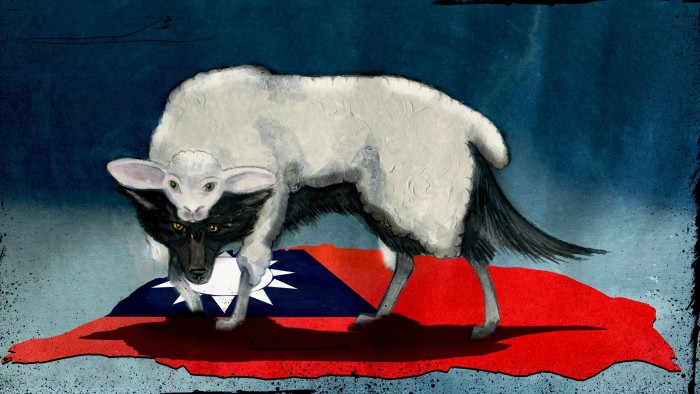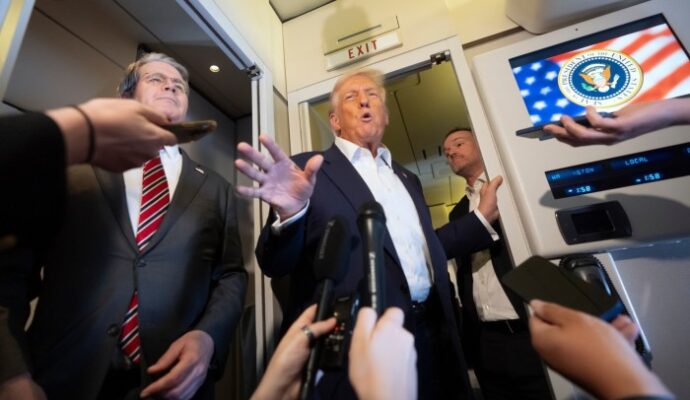
Unlock the White House Watch newsletter for free
Your guide to what Trump’s second term means for Washington, business and the world
“They stole our chip business . . . and they want protection.” That was Donald Trump, musing about Taiwan, last year on the Joe Rogan show.
Remarks like that will prey on the minds of the Taiwanese, as Trump prepares to meet Xi Jinping this week. Trade will be the main item on the agenda. But Taiwan will also be discussed by the US and Chinese leaders.
As president, Joe Biden said on four separate occasions that the US would fight to defend Taiwan. Trump has said no such thing. Instead, he has hit Taiwan with 20 per cent tariffs and tried to force the country’s crucial semiconductor company TSMC to move its operations to the US.
Meanwhile, China’s military build-up and pressure on Taiwan continues apace. At the same time, reports are swirling that the Pentagon is about to announce a major reorientation of US defence policy — concentrating on the western hemisphere at the expense of east Asia.
All of this is creating anxiety in Taiwan and excitement in the People’s Republic of China — where some foreign-policy thinkers are eagerly anticipating an American betrayal of Taiwan. On a recent visit to Shanghai, a prominent Chinese nationalist told me gleefully that once the US walked away, Taiwan would have no option but to fold and accept “reunification” on Chinese terms.
The hopes of the Chinese Communist party and the fears of the Taiwanese are understandable. But they are also overdone. The likelihood of complete American abandonment of Taiwan is still remote. And even if Taiwan were left to defend itself, subduing the self-governing island would remain a formidably difficult challenge for Beijing.
The argument that Taiwan deserves to be defended because it is a democracy is not one that is likely to appeal to Trump. In fact, some in the Maga movement regard Taiwan as annoyingly woke. (The country was the first in Asia to recognise same-sex marriage).
But preventing Taiwan from falling under the sway of China is a critical US interest. TSMC produces 90 per cent of the world’s most advanced semiconductors. The company and its complex web of supply chains cannot be moved wholesale to Arizona. Allowing China to in effect take control of the world’s semiconductor industry would be a big blow to America’s economic security.
There is also a broader strategic argument. The US has been the dominant power in the Pacific since the end of the second world war. Taiwan remains a central part of the “first island chain” — a geographic barrier that also includes Japan and the northern Philippines. That chain helps to contain the Chinese navy and prevents it from dominating the Pacific Ocean.
With east Asia now the core of the global economy, it would be folly for the Americans to acquiesce in Chinese hegemony over the region. But that is how the abandonment of Taiwan to Beijing would be perceived. Even if Trump is tempted to go along with that kind of notion, as part of a “deal” with Xi, wiser heads in Washington would probably talk him out of it — just as he was persuaded not to completely abandon Ukraine.
The costs to China of mounting an invasion of Taiwan, in the face of US opposition, would be staggering. A recent report from the Stimson Center argues convincingly that invading Taiwan would be “among the most complex and dangerous military operations in history”. A war game exercise carried out by the Center for Strategic and International Studies concluded that the People’s Liberation Army would suffer catastrophic losses in an attempted invasion: 138 ships, 155 aircraft and tens of thousands of troops.
But what if America stood to one side? The assumption that Taiwan would fold without a fight is also probably false. In a recent poll, more than two-thirds of Taiwanese said they would fight to defend the island. Taiwan is well stocked with the anti-ship missiles that have proved so effective in the Ukraine war. A Chinese invasion fleet would be extremely vulnerable to attack as it tried to cross the Taiwan Strait.
Many analysts believe that China is therefore more likely to attempt a naval blockade that would starve the island of food, energy and other resources — potentially forcing it into negotiations on Beijing’s terms. Taiwan imports most of its energy and by some estimates the island might run out of natural gas within 10 days.
The Taiwanese, however, believe that if they adopted energy and food rationing they could weather a blockade for six months. China would struggle to cut off all trade with Taiwan for that length of time — particularly given the intense diplomatic, economic and military pressure that it would come under from the US, Japan and other western democracies, whose own economies would be profoundly affected by a blockade of the Taiwan Strait.
Invading or blockading Taiwan would be an incredibly reckless act by President Xi — gambling with China’s economy and international position and his own political future. Unfortunately, as Vladimir Putin’s attack on Ukraine in 2022 demonstrated, autocratic leaders are capable of making miscalculations of that sort.
That is why loose talk by Trump on Taiwan remains dangerous. If the US president truly wants to be remembered as a peacemaker, he cannot afford to accidentally open the door to a Chinese invasion of the island.


